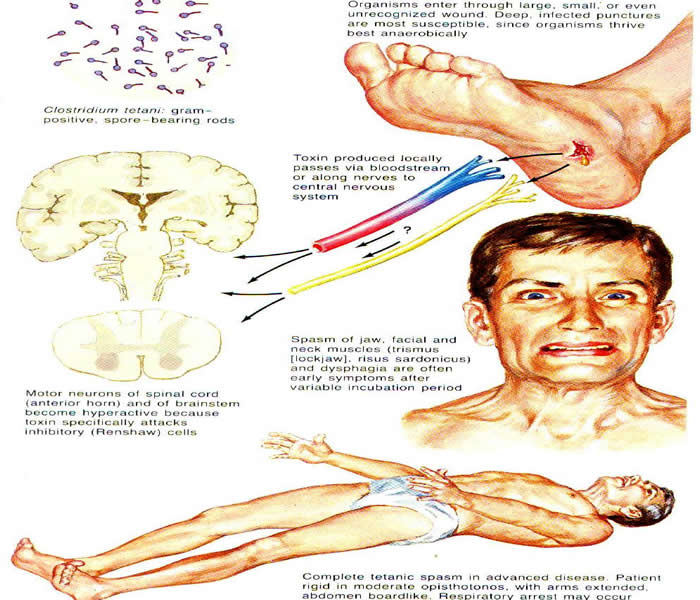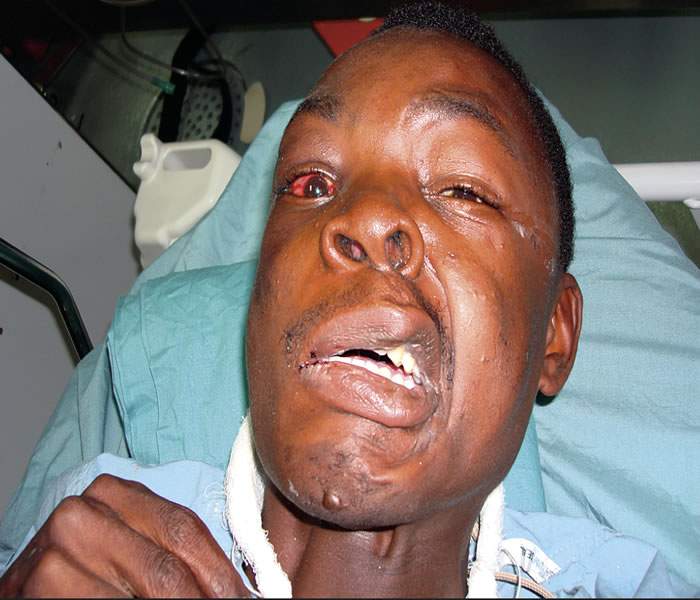TETANUS
What Is Tetanus?
Dehydration is a condition that occurs when the fluid loss from the body exceeds the amount that the body takes in. Mostly water is the fluid that loss in the body that leads to dehydration with dehydration, more water is moving out of our cells and bodies than what we take in through drinking.
Most children who die from diarrhea die not because of stooling (watery poo poo) but because they do not have enough water left in their bodies. When there is no enough water in the body it lead to dehydration in turn dehydration leads to death.

What Is Tetanus?
Tetanus which also known as lockjaw is a serious infection caused by Clostridium tetani bacteria which produce a toxin that affects the brain and nervous system. The toxin leads to stiffness in the jaw muscles as well as other muscles. The infection can cause severe muscle spasms, serious breathing difficulties, and can ultimately b e fatal.
It is a bacterial disease marked by rigidity and spasms of the voluntary muscles. The prolonged contraction of a muscle caused by rapidly repeated stimuli.
This bacterium is found throughout the world in the soil and in animal and human intestines. The bacterium can also lay dormant in its spore form for years before becoming activated and developing into a regularly reproducing bacterium.
Causes of Tetanus
The tetanus bacteria often enter the body through a puncture wound, which can be caused by nails, splinters, insect bites, burns, any skin break, and injection-drug sites.
It is bacteria live in soil, dust and manure, particularly horse manure. Infection occurs when the bacteria enter the body through a break in the skin. Signs occur between three days and three weeks after infection. Most cases occur within 14 days. Tetanus is not transmitted from person to person.
The tetanus bacteria get in a wound through a break in the skin or mucous membrane. Wound such as
A Cut
· Animal bites - Any injury that breaks the skin or mucous membrane
· Burns
· Chronic sores and infections
· Deep scrape
· Puncture wounds from piercings or tattoos
· Wounds contaminated with dirt, feces, or saliva
What is the incubation period for tetanus?
The incubation period between exposure to the bacteria in a contaminated wound and development of the initial symptoms of tetanus ranges from three days to three weeks, but it's commonly within 14 days of injury.
Note: Tetanus is not contagious from person to person. It is the only vaccine-preventable disease that is infectious, but not contagious.
Symptoms/Signs of Tetanus
- Difficulty swallowing
- Fever and sweating.
- Headache.
- High blood pressure and fast heart rate.
- Jaw cramping.
- Jerking or staring (seizures)
- Painful muscle stiffness all over the body.
- Sudden, involuntary muscle tightening in the stomach ( Stiffness of your abdominal muscles)
How to diagnose Tetanus
Tetanus is usually made by observing the clinical presentation or history of a recent injury resulting in skin breakage
Check how regular is the heartbeat
Continuous high blood pressure
History about incomplete tetanus immunizations.
In localized tetanus, pain, cramps, or muscle spasms occur at or near a recent skin injury.
Progressive muscle spasms (starting in the facial region, especially lockjaw and progressing outward from the face to include all muscles of the body)
Your doctor will also perform a physical examination to check for symptoms of tetanus, such as muscle stiffness and painful spasms.
Laboratory tests are rarely used to diagnose tetanus. However, some reference labs can determine if the patient has serum antitoxin levels that are protective, and thus a positive test detecting these levels suggests that the diagnosis of tetanus is unlikely.
How to Prevent Tetanus
All children and adults should be immunized against tetanus by receiving vaccinations. A tetanus booster is needed every 10 years after primary immunization or after a puncture or other skin wound that could provide an entry point for the tetanus bacteria to enter the body. You can help prevent tetanus by having all of the suggested tetanus immunizations. There are three different types of tetanus immunizations or vaccine. They are:
Diphtheria
Tdap
Td
Diphtheria , tetanus, and pertussis (DTaP)is also known as the primary vaccination series. This vaccine is given in a series of five shots starting at age 2 months and ending at ages 4 to 6 years.
Tdap (tetanus, diphtheria, and pertussis). This is the one to take after the first series that the last one was taken at age 6,it is the first booster shot for tetanus and is recommended for all preteens at age 11 or 12. As for all teens and adults who have or expect to have close contact with a baby younger than one year old should also get this shot. It is also use to protect against whooping cough (pertussis).
Td (tetanus and diphtheria) vaccine. This vaccine is given as a booster shot every 10 years.
When would I know that I need Tetanus injection (shot)
You will need it if:
- Your wound was caused by something that was clean and your last tetanus shot was longer than 10 years ago.
- Your wound was caused by something that was dirty and your last tetanus shot was longer than 5 years ago.
- You are not sure if your wound was caused by something clean or dirty and your last tetanus shot was longer than 5 years ago.
- You are not sure when you had your last tetanus shot.
- You did not get the first series of tetanus shots (primary vaccination series).
If your case is like this listed above call your doctor to arrange for a shot.

Treatment for Tetanus
Tetanus is a life-threatening disease and sometimes, death will occur even with prompt medical attention.
If you have a wound, what do you need to do?
Cleaning the wound is essential to preventing growth of tetanus spores. This involves removing dirt, foreign objects and dead tissue from the wound.
Antitoxin such as tetanus immunoglobulinm to neutralise any tetanus toxin that is circulating and not yet attached to nerve tissue
Hospitalisation
Anti-convulsive medications
Antibiotics
If the victim have severe breathing problems he may be placed on an artificial respirator.
Vaccination – All people with tetanus should receive the tetanus vaccine as soon as they're diagnosed with the condition.
Doctors generally use powerful sedatives to control muscle spasms.
Severe tetanus infection often requires a long stay in an intensive care setting. Since sedatives can inhibit breathing, you might temporarily need a ventilator. Seek medical advice for dirty wounds or wounds where the skin has been penetrated.
Tetanus Home Remedies/Home Cure
Deep burnt, cuts, scrapes and puncture wounds must be washed and cleaned to remove any debris or foreign particles to prevent infection. Wash wounds and cuts with hot water and wipe it with cotton wool clean it and apply an anti-septic cream or powder, this will help prevent infection.
Home remedies for tetanus prevention include
Immersing the injured part of the body in hot water, smearing a raw poultice of ground peach leaves or a poultice of powdered turmeric and hot candle wax on the wound.
If stiffness is experienced hot turpentine is used to apply on the wound as well as to massage the neck, arms and jaw.
It must be remembered that the focus of home remedies should be prevention of infection and treatment of symptoms. Once the infection sets in and the toxin produced by the bacteria starts affecting the nerves and the muscles, treatment with antitoxin and tetanus immunoglobulin, combined with antibiotics is vital to prevent fatal consequences.
Complications of Tetanus
The extremely serious and complications of tetanus can include:
- Heart attack.
- Hypertension (high blood pressure)
- Hypotension (low blood pressure)
- Pneumonia
- Respiratory failure
- Suffocation




